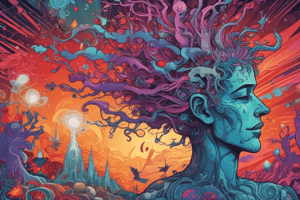Podcast
Questions and Answers
Suspiciousness, convulsions, and cardiac arrest are aversive reactions most closely associated with the use of:
Suspiciousness, convulsions, and cardiac arrest are aversive reactions most closely associated with the use of:
- Marijuana
- Cocaine (correct)
- Barbiturates
- Heroin
With repeated use of most psychoactive drugs, the immediate pleasant effects become ________ and the unpleasant aftereffects become ________.
With repeated use of most psychoactive drugs, the immediate pleasant effects become ________ and the unpleasant aftereffects become ________.
- Less strongly pleasant; less strongly unpleasant
- Less strongly pleasant; more strongly unpleasant (correct)
- More strongly pleasant; less strongly unpleasant
- More strongly pleasant; more strongly unpleasant
By triggering the release of epinephrine and norepinephrine, ________ boosts alertness and diminishes appetite.
By triggering the release of epinephrine and norepinephrine, ________ boosts alertness and diminishes appetite.
- THC
- Nicotine (correct)
- Heroin
- Alcohol
THC, the active ingredient in ________, is classified as a ________.
THC, the active ingredient in ________, is classified as a ________.
After ingesting a small dose of a psychoactive drug, Lana experienced vivid visual hallucinations and felt as if she were separated from her own body. Lana most likely experienced the effects of:
After ingesting a small dose of a psychoactive drug, Lana experienced vivid visual hallucinations and felt as if she were separated from her own body. Lana most likely experienced the effects of:
Symptoms of drug withdrawal are likely to be:
Symptoms of drug withdrawal are likely to be:
Young teens are most likely to start smoking in order to:
Young teens are most likely to start smoking in order to:
The greatest danger of viewing drug addiction as a disease is that this may lead drug addicts to:
The greatest danger of viewing drug addiction as a disease is that this may lead drug addicts to:
One biological basis for addiction involves brain activity in the ________ reward system.
One biological basis for addiction involves brain activity in the ________ reward system.
Prolonged and excessive drinking can shrink the brain most intensely in ________ who have ________ of a stomach enzyme that digests alcohol.
Prolonged and excessive drinking can shrink the brain most intensely in ________ who have ________ of a stomach enzyme that digests alcohol.
Drug use is considered a disorder when a person:
Drug use is considered a disorder when a person:
An official ranking of drugs according to the likelihood of their hooking the user ranked ________ as the most addictive.
An official ranking of drugs according to the likelihood of their hooking the user ranked ________ as the most addictive.
Chemical substances that alter perceptions and moods are called ________ drugs.
Chemical substances that alter perceptions and moods are called ________ drugs.
Sixteen-year-old Bethany is becoming increasingly concerned about her use of marijuana on weekends. To reduce her use of this drug, Bethany should:
Sixteen-year-old Bethany is becoming increasingly concerned about her use of marijuana on weekends. To reduce her use of this drug, Bethany should:
Repeated use of an opiate:
Repeated use of an opiate:
Flashcards are hidden until you start studying
Study Notes
Key Concepts in Drug Use and Addiction
-
Aversive Reactions: Cocaine use is associated with suspiciousness, convulsions, and cardiac arrest.
-
Pleasant and Unpleasant Effects: With repeated psychoactive drug use, immediate pleasant effects diminish while unpleasant aftereffects intensify.
-
Stimulant Effects: Nicotine increases alertness and suppresses appetite by releasing epinephrine and norepinephrine.
-
THC Classification: THC, the main active component of marijuana, is categorized as a hallucinogen.
-
Psychedelic Hallucinations: LSD use results in vivid visual hallucinations and a sensation of detachment from the body.
-
Drug Withdrawal Severity: Withdrawal symptoms are most pronounced in individuals with high drug tolerance.
-
Social Influences on Smoking: Young teens often begin smoking primarily to achieve social acceptance.
-
Perception of Drug Addiction: Viewing addiction as a disease can lead individuals to feel powerless in overcoming their addiction.
-
Dopamine's Role in Addiction: The brain's reward system, particularly the dopamine pathway, is significant in understanding addiction.
-
Effects of Prolonged Drinking: Women, particularly those with lower levels of the stomach enzyme to metabolize alcohol, are at greater risk for brain shrinkage from excessive drinking.
-
Criteria for Drug Use Disorder: Drug use is classified as a disorder when individuals experience cravings, continue use despite risks, face social problems, and a combination of these conditions.
-
Drug Addiction Rankings: Tobacco is ranked as the most addictive drug based on the likelihood of leading to addiction.
-
Psychoactive Drugs Definition: Substances that alter mood and perception are defined as psychoactive drugs.
-
Reducing Marijuana Use: To cut down on marijuana use, reducing association with peers who use it is an effective strategy.
-
Impact of Opiate Use: Repeated opiate use results in decreased brain production of natural endorphins, not an increase in heart or breathing rates, nor serious withdrawal symptoms.
Studying That Suits You
Use AI to generate personalized quizzes and flashcards to suit your learning preferences.




